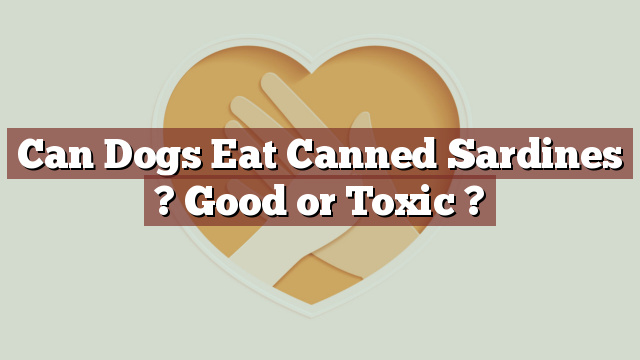Can Dogs Eat Canned Sardines? Good or Toxic?
As responsible pet owners, it is crucial to be aware of what foods are safe and healthy for our furry friends. One such food that often sparks curiosity is canned sardines. Known for their rich nutritional profile, sardines can be a great addition to a balanced canine diet. In this article, we will explore the nutritional value, safety, potential risks, and benefits of feeding dogs canned sardines.
Nutritional Value of Canned Sardines: Essential for a Balanced Canine Diet
Canned sardines are packed with essential nutrients that can benefit dogs’ overall health. These small fish are an excellent source of omega-3 fatty acids, protein, vitamins, and minerals. Omega-3 fatty acids, such as EPA and DHA, are known for their anti-inflammatory properties and play a significant role in promoting heart, joint, and brain health. The protein content in sardines helps support muscle growth and repair, contributing to a strong and healthy body.
Additionally, canned sardines are rich in calcium, phosphorus, and vitamin D, which are vital for maintaining strong bones and teeth. The presence of B vitamins, including B12 and niacin, aids in energy production and supports a healthy metabolism. With such a well-rounded nutritional profile, canned sardines can be a beneficial addition to a dog’s diet.
Are Canned Sardines Safe for Dogs? Uncovering the Truth
Yes, dogs can safely consume canned sardines. However, it is important to choose the right type of sardines and feed them in moderation. Opt for sardines packed in water without any added salt or seasoning. Avoid sardines packed in oil, as the additional fats may not be suitable for your dog’s diet. Always check the label to ensure there are no harmful ingredients that could be detrimental to your dog’s health.
While sardines offer numerous health benefits, it is worth noting that some dogs may have specific dietary restrictions or allergies. If your dog has any pre-existing health conditions or dietary sensitivities, consult with your veterinarian before introducing canned sardines into their diet.
Potential Risks and Benefits of Feeding Dogs Canned Sardines
Feeding your dog canned sardines in moderation can provide several health benefits. The omega-3 fatty acids found in sardines help promote healthy skin and a shiny coat, reducing the risk of dryness, itchiness, and inflammation. These fatty acids also support cognitive function, improving brain health and minimizing the risk of cognitive decline in older dogs.
However, it is crucial to exercise caution when introducing sardines into your dog’s diet. The high sodium content in some canned sardines can be harmful to dogs, especially those with underlying health conditions such as kidney or heart problems. Always choose low-sodium options or rinse the sardines under water to reduce the sodium content before feeding them to your dog.
Dog Ate Canned Sardines: Steps to Take for Safety and Health
If your dog accidentally consumes a can of sardines, it is essential to take appropriate steps to ensure their safety. While canned sardines are generally safe for dogs, the size of the can and potentially sharp edges can pose a choking or injury hazard. Remove any remaining sardines from your dog’s reach and monitor them closely for any signs of discomfort or distress.
If your dog exhibits symptoms such as vomiting, diarrhea, or difficulty breathing after consuming canned sardines, contact your veterinarian immediately. They will be able to provide appropriate guidance and medical assistance if necessary.
Conclusion: Canned Sardines Can Be a Healthy Addition to Your Dog’s Diet
In conclusion, dogs can safely eat canned sardines as part of a balanced diet. The nutritional value they offer, including omega-3 fatty acids, protein, vitamins, and minerals, can contribute to your dog’s overall health and well-being. However, it is important to choose low-sodium options and feed sardines in moderation. As always, consult with your veterinarian to ensure your dog’s specific dietary needs are being met and to address any concerns or questions you may have. Adding canned sardines to your dog’s diet can be a tasty and nutritious treat for them to enjoy.
Thank you for investing your time in exploring [page_title] on Can-Eat.org. Our goal is to provide readers like you with thorough and reliable information about various dietary topics. Each article, including [page_title], stems from diligent research and a passion for understanding the nuances of our food choices. We believe that knowledge is a vital step towards making informed and healthy decisions. However, while "[page_title]" sheds light on its specific topic, it's crucial to remember that everyone's body reacts differently to foods and dietary changes. What might be beneficial for one person could have different effects on another. Before you consider integrating suggestions or insights from "[page_title]" into your diet, it's always wise to consult with a nutritionist or healthcare professional. Their specialized knowledge ensures that you're making choices best suited to your individual health needs. As you navigate [page_title], be mindful of potential allergies, intolerances, or unique dietary requirements you may have. No singular article can capture the vast diversity of human health, and individualized guidance is invaluable. The content provided in [page_title] serves as a general guide. It is not, by any means, a substitute for personalized medical or nutritional advice. Your health should always be the top priority, and professional guidance is the best path forward. In your journey towards a balanced and nutritious lifestyle, we hope that [page_title] serves as a helpful stepping stone. Remember, informed decisions lead to healthier outcomes. Thank you for trusting Can-Eat.org. Continue exploring, learning, and prioritizing your health. Cheers to a well-informed and healthier future!

